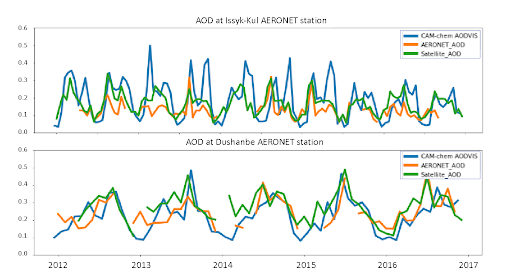A pilot study takes a look at air quality in Central Asia
The Central Asia region includes the five countries Kyrgyzstan, Uzbekistan, Kazakhstan, Tajikistan, and Turkmenistan. Air pollution is a major societal and environmental issue in this region, yet little research has been done to understand the extent of the problem and its causes. Janyl Madykov, a student from Kyrgyzstan who came to the USA in 2018 as a Fulbright Scholar, conducted a virtual internship at ACOM in 2020 to collaborate with scientists on taking a deeper dive into this issue and learn about techniques in air quality research. Her internship was supported by the Muskie Internship Program.
In a first study she combined aerosol measurements from U.S. embassies surface monitors, AERONET stations and satellite with global CAM-Chem simulations. Preliminary results show that human-caused activities are the main contributor to wintertime particle pollution while dust storms are a major source in summertime. Seasonal patterns and the importance of different sources vary amongst the different countries. AERONET fine and coarse particle aerosol optical depth (AOD) was found to be extremely valuable in identifying source contributions. The CAM-Chem simulated AOD compared well with measurements at the Dushanbe station in Tajikistan, however at the Issyk-Kul site in Kyrgyzstan the modeled AOD showed significantly higher peaks compared to the measurements pointing to uncertainties in the CAM-Chem dust parameterizations.
This preliminary and ongoing analysis demonstrates the importance of both anthropogenic pollution and desert dust in the region; however, little observational evidence is available and more observational stations are needed to better characterize the air pollution in Central Asia.

Figure 1. Comparison of AOD at 500 nm from CAM-Chem, AERONET measurements and satellite data at the Issyk-Kul and Dushanbe AERONET sites for 2007-2017.